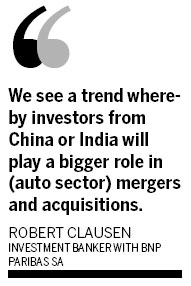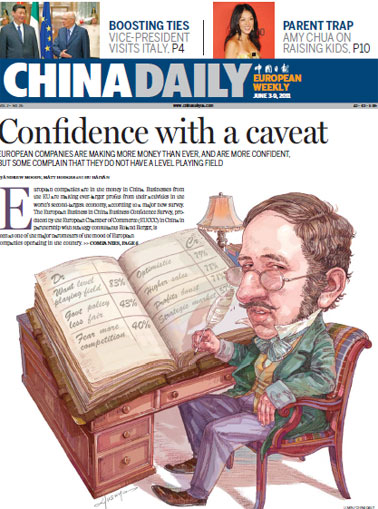Cars
European rethinks on China's auto M&A
Updated: 2011-05-20 10:02
By Edward Taylor and Alexander Huebner (China Daily)
 |
|
A customer views a Geely Auto passenger car. The terms of purchase of Volvo AB were set by the Europeans when the Chinese automaker purchased the ailing Swedish car firm last year. [Photo/China Daily] |
Chinese market is proving all but irresistible for overseas producers
FRANKFURT - China's growth prospects, combined with Western companies' fears of being shut out of the world's largest auto market, are leading to a shift in attitude toward Chinese rivals buying into Europe's auto sector.
Takeovers by Chinese buyers were often stymied by the European targets' refusal to sell, three bankers familiar with the auto sector told Reuters. Meanwhile, European manufacturers sought to differentiate themselves from South Korean and Chinese rivals with premium high-technology offerings.
Chinese acquisitions of key technology companies in Europe remain the exception and not the rule, the bankers said. So far, the sale of European assets to Chinese companies has happened on terms set by the Europeans, or after European buyers declined to make an offer. That way Geely Automobile Holdings Ltd was able to snare Volvo AB, and Nanjing Auto bought the UK's MG-Rover.
|
||||
"We could see a large deal involving a European auto supplier," said one banker active in the auto sector, who declined to be identified. How sensitively the European auto sector reacted to acquisitions by outsiders was demonstrated when Volkswagen's Chairman Ferdinand Piech threatened to cancel all of the group's contracts with Magna International Inc if the Canadian auto supplier bought General Motors Co's German-based Opel unit. General Motors ended up keeping Opel.
More recently, Chinese companies have been able to strike deals that only a few years ago would have seemed unthinkable. "One cannot afford to ignore Chinese investors, given the size of the Chinese market," said Robert Clausen, an investment banker with BNP Paribas SA.
"We see a trend whereby investors from China or India will play a bigger role in (auto sector) mergers and acquisitions," Clausen said. 
The speed with which China's Wanhua Industrial Group took control of Hungarian auto supplier BorsodChem in February showed a new level of decisiveness on the part of Chinese companies, one of the bankers said. BorsodChem, a maker of resins and specialty chemicals used in the automotive and electronics industries, went through financial restructuring in June last year. That gave China's Wanhua an opportunity to take a 38 percent stake before clinching full control in February this year.
Earlier this month, Chongqing Light and Textile Holding Group struck a deal to buy insolvent Saargummi Technologies, a supplier of auto body seals and mouldings, for around 130 million euros ($185.4 million).
In other deals, China's largest listed car distributor, Pangda Automobile Trade Co Ltd, has come to the rescue of Saab AB, and Preh Group, a maker of vehicle electronics, was sold to China's Joyson Investment Holdings. As European auto suppliers and automakers seek to expand, they need to work with a local joint venture partner, a factor that makes it difficult for European companies to shut the door when Asian buyers come shopping.
China said it found some US-made passenger cars benefited from unfair subsidies, damaging domestic carmakers. But with growth in China set to continue, resistance to Asian buyers has softened.
Car sales in China jumped 33.2 percent in 2010, and according to a KPMG study, Germany exported more than twice as many cars to China than a year earlier.
Growth in China is seen slowing this year, but prospects for premium automakers remain bright, BernsteinResearch said in a report published in April, echoing upbeat comments from companies such as Daimler AG and BMW AG.
German premium auto sales in China rose almost 100 percent in 2010, and premium auto sales penetration as a percentage of overall vehicle sales there are still 30 percent below the world average, leaving some room to expand, BernsteinResearch said.
Reuters
E-paper

Tapping into the future
Foreign companies are investing in China's water industry as many predict a growing profit margin.
Preview of the coming issue
Headhunters ride on growth
Commercial property rides wave
Specials

Cuisine central
London's Chinatown is helping diners appreciate full palate of Chinese food

Tying the knot
Danish couple's high-end macrame export business takes off in the mountains of Yunnan.

Truly a super woman
Li Yuchun first came to prominence in 2005 as the Super Girl winner, and since then has become an international star.




